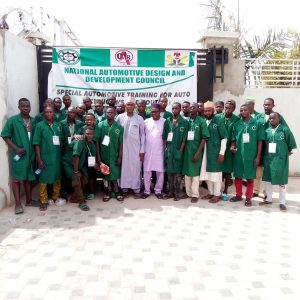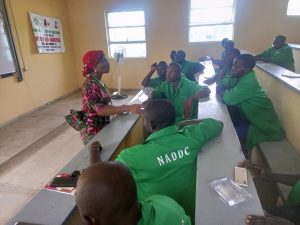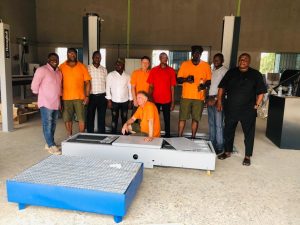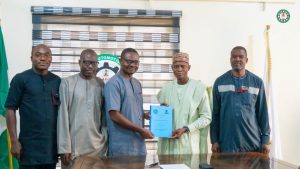.gif)
.gif)
Seventeen (17) out of the training centres have been completed. The state-of-the-art equipment procured for the completed centres and installation is ongoing. On May 26th, 2023, the ATC, Ado Ekiti was commissioned by the Hon. Minister of Industry, Trade and Investment, Otunba Adebayo and training has commenced there already.
Council and its stakeholders have developed the National Occupational Standards (NOS) for Conversion, Calibration and Maintenance of Auto Gas-Powered Vehicles in Nigeria and National Occupational Standards for Electric Vehicle Repairs and Maintenance and it fits into National Skills Qualifications Framework (NSQF) for Nigeria.
Council in conjunction with SON, Consumer Protection Council (CPC) and other relevant stakeholders developed a handbook on the safe choice, storage and use of tyres. This handbook is being used to carry out sensitization and awareness campaigns across the country.
Over 20,000 persons have so far been trained on the repair and maintenance of heavy-duty vehicles/tractors, as well as specialized mechatronics training for auto technicians/youths.

Also, the Council assisted a private firm to establish and commission the first female mechanic workshop in Sokoto, Sokoto State. The workshop has graduated its first set of trainees.

In its bid to provide conducive environment for mechanics to repair vehicles in a safe and effective manner, the Council conceived the mechanic village. An Outline Business Case (OBC) Study was conducted for the establishment of mechanic’s village in 12 states through a PPP scheme. The OBC report has been forwarded to the state governments to study prior to its implementation.
The Council in collaboration with the Nigerian Universities Commission developed a Curriculum for teaching automotive engineering in Nigerian Universities.
This has led to the offering of Automotive Engineering at Bachelor’s Degree level in Nigerian universities. Examples of univerisities currently offering it are University of Lagos, Abubakar Tafawa Balewa University, Bauchi, Elizade University, Ilara-Mokiin, Ahmadu Bello University, Zaria and University of Ibadan. Plans are on for the review of the curriculum to update it in line with current realities.
On the approval of the Federal Executive Council (FEC), NADDC has awarded the contract for the supply of automotive mechatronics diagnostic equipment for seven (7) auto skills training Centre and three (3) service hubs. Equipment for these centres have been supplied in their respective locations. Currently, installation of equipment/tools is on- going in four (4) of the Centres.

The Council collaborated with National Social Investment Office (NSIO), the Job Creation Unit of the Presidency and the Federal Ministry of Humanitarian Affairs, Disaster Management and Social Development on the N-Power programme. It was a programme designed to help youth’s unemployment amongst non-graduate youths. About 24,000 Nigerians youths were trained and empowered through the programme.
The Sector Skills Council (SSC) for the automotive industry was inaugurated in 2016 by National Automotive Design and Development Council (NADDC) following the approval granted by the Regulatory Body, National Board for Technical Education (NBTE). SSC was charged with the responsibility of setting of standards, regulating and overseeing the entire training delivery and certification in the auto industry with a view to ensuring that technicians are relevant to the needs of the industry. A certificate was granted to Council recently. At the plenary meeting of the Sector Skills Council (SSC) in 2022, it proposed for establishment of an institute that will serve as an Awarding Body for NADDC.
NADDC being the foremost agency in charge of the Automotive Industry in Nigeria collaborated with the NGEP to promote the development of Auto-Gas Powered vehicles in Nigeria as well as provide the enabling environment for it to thrive. In line with the above mandate, the Council organized the first National Awareness workshop on the Safe Usage of Auto Gas Vehicles in Nigeria in September, 2021.
The Council also designed and produced “Information Guide on Natural –Gas-Powered Vehicles in Nigeria”. The list of equipment/tools required in an Auto Gas Conversion Workshop/Garage was also developed. The Council equally designed the template for the certification and accreditation of Auto Gas Conversion Workshops/Garages.
It has also developed National Occupational Standards (NOS) for the conversion of fuel-powered cars from petrol to gas. The draft NOS is awaiting validation by industry practitioners before being sent for approval by the regulatory authority (NBTE). When approved the NOS would be used to train auto technicians on the conversion, repair and maintenance of gas powered vehicles. NADDC is equally supporting the development of gas-powered vehicles in Nigeria through the formulation and implementation of automotive gas policy.
Auto gas policy is an integral part of the newly approved NAIDP. To demonstrate the Council’s seriousness on Auto Gas, the Council has converted some of its vehicles to Auto Gas. Some locally made Auto Gas vehicles have also been procured by the Council for usage by staff. Recently, a team from the Council visited Italy aimed at understudying companies who are into the manufacture of conversion kits for both original equipment manufacturers (OEMs) and second tier markets. The companies visited were: Fornovo Gas, Fornovo Gas Dispensing Outlet and Westport Fuel Systems.
The Council participated in annual conferences/activities of Professional Bodies such as Nigerian Society of Engineers (NSE), Council for the Regulation of Engineering (COREN). Also, Trade Association such as National Automotive Technicians Association (NATA), Motor Mechanic Technicians Association of Nigeria (MOMTAN).
Recently, the Nigerian Institute of Mechanical Engineers (NIMechE) a division of the Nigerian Society of Engineers conferred a Honourary Fellowship on the Director- General NADDC.

Copyrights © NADDC | All Rights Reserved.